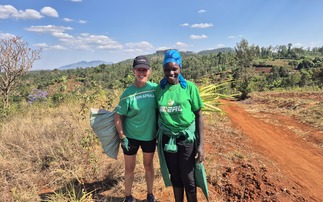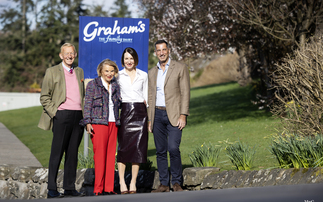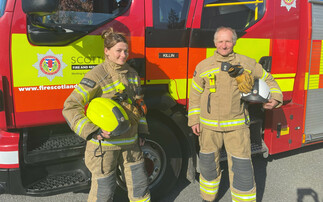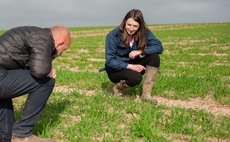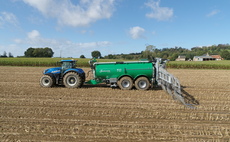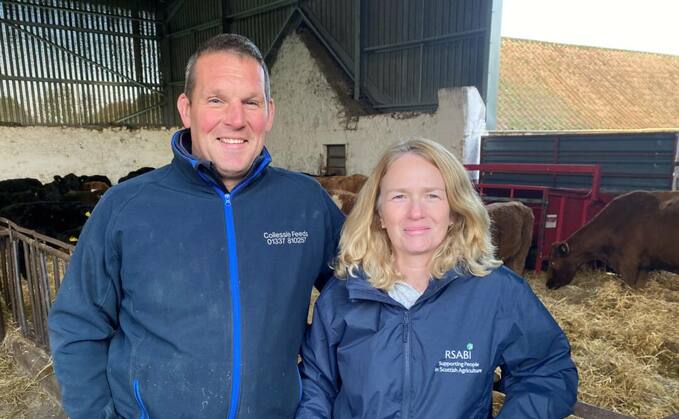
Fife farmer Eric Black and RSABI chief executive Carol McLaren have worked together to promote dyslexia in the farming community
A Scottish agricultural charity has announced a new initiative to raise awareness of dyslexia in the farming community.
RSABI said it would provide free professional assessments to farmers - particularly over 40 years-old - who may never have been tested or unaware they have a learning difficulty commonly associated with problems in reading, writing and spelling.
The campaign coincides with Scottish dyslexia awareness week (November 1-7) which aims to drive awareness of dyslexia and the steps to improve levels of communication in farming.
Fife farmer Pete Black, who farms at Newton of Collessie, spoke openly about his late diagnosis of dyslexia as an adult and how it should not stop others from taking an assessment.
"When I was at school in the 1990s, dyslexia was not spoken about very much but I knew I was always last to finish my reading," Mr Black said.
"The words would jumble in my head when I was looking at them and then they would jumble even more when I tried writing them down.
"Teachers these days are spot on and for my age group and older, the awareness is becoming better, which is fantastic.
"I am lucky to do a job I love but it was a great relief to me to discover I had dyslexia and to know the reason I was struggling was not down to a lack of effort or not trying hard enough.
See also: Young Farmer Focus - Rachel Barr: "I cannot see myself as anything other than a farmer"
"My advice to any young person, and especially those in farming, is dyslexia should not hold you back in any way.
"You just have to find the best management technique for yourself - whether it is different fonts or different colours of paper you read from.
"Try not to worry as there are hundreds of successful people living life to the full who have a dyslexia and it has not stopped anyone doing anything.
"It is just a different way to look at a problem."
See also: Everyone can tell farming's story
Carol McLaren, chief executive of RSABI, said the charity was delighted to be working with Dyslexia Scotland on the initiative.
"We are regularly contacted by farmers who are struggling with dyslexia and we know it can be worrying and distressing to be struggling to read and understand information, particularly for farmers with dyslexia living on their own," Ms McLaren added.
"The reality is simple steps like using certain fonts, avoiding white paper or backgrounds and block text can make a big difference, along with providing video and infographic content."
Around 25 per cent of Scotland's farmers are estimated to have dyslexia, according to Dyslexia Scotland.
Cathy Magee, chief executive of Dyslexia Scotland said she was inspired by RSABI's work to raise awareness of dyslexia in the agricultural sector.
See also: Time for the Scottish Government to listen to farmers' pleas on the impact of flooding
"It is very encouraging to see the work being done by RSABI to raise awareness about dyslexia and to offer support for those who need it in the farming community," Ms Magee added.
"We particularly welcome initiatives such as RSABI's offer of a free dyslexia assessment to farmers and crofters during the months of November and December 2023.
"As the cost of an adult dyslexia assessment is so high, there are many who simply cannot afford to get assessed, which in turn means they cannot access the support they need.
"This is an excellent example of an organisation which is leading the way in working towards a dyslexia-friendly Scotland.
"We hope other organisations will follow their lead."
See also: Blind farmer receives prestigious Points of Light award for encouraging diversity in farming
To arrange a free assessment, which typically costs around £500, people involved in farming or crofting in Scotland should contact RSABI's 24-hour freephone Helpline: 0808 1234 555.
RSABI is also encouraging farmers and others involved in the agricultural industry to be open and proactive in sharing positive stories about dyslexia to help drive awareness and change.
More information can be found here.
See also: Micro dairy allows farmer to pursue passion - 'I have finally got there'












